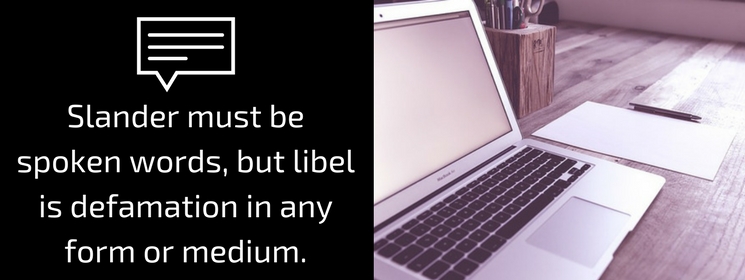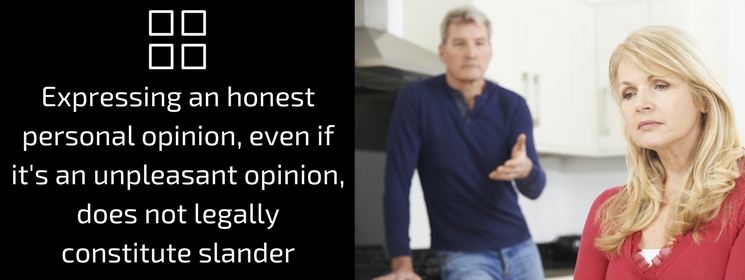This article was updated: March 3rd, 2023
Slander is oral defamation. It happens when someone tells one or more persons a falsehood about another person and the falsehood harms the reputation of the person being defamed. This is where an Oakland employer retaliation law firm can help.
In the state of California, slander is a civil wrong. A person or even a company can be sued for slander.
Some allegations, such as a false accusation of committing a crime, having a dangerous communicable disease, or being unable to perform one’s work are considered slander “per se,” because the harm that can be done is obvious.
In such cases, a defendant may be ordered by a court to pay punitive damages as well as documentable economic damages to the plaintiff.
Under California law, there are two types of defamation – libel and slander. Slander must be spoken words, but libel is defamation in any form or medium.
Defamatory statements made on television or radio are considered libel, however, rather than slander, on the presumption that television and radio reach an audience as large if not larger than printed publications reach.
In California, if you are a victim of either slander or libel in the workplace, and if that slander or libel has caused you injury or harm, you should discuss your legal rights and potential options with a skilled San Francisco employment rights attorney.
Slander in the workplace can be particularly humiliating and damaging, but in most cases, the law in California can offer recourse to the victims of workplace slander.
If you are slandered at your workplace and you choose to bring legal action against the person who slandered you, you first must prove that a false statement about you was made to a third party.
This can be difficult to prove unless there are reliable witnesses or the statement was recorded in some way.
WHAT IS THE KEY TO WINNING A SLANDER LAWSUIT?
Secondly, even if you prove that a false statement was made about you, you will also have to prove that the false statement caused demonstrable harm or injury to you and/or to your reputation.
Finally – and this is the key to understanding slander – to win a slander lawsuit, the alleged victim – the plaintiff – must be able to prove that the person who made the false statement – the defendant – knew or should have known that the statement was false.
Expressing an honest personal opinion, even if it’s an unpleasant opinion, does not legally constitute slander.
The kinds of statements that may constitute employment-related slander can include but are not necessarily limited to accusing someone falsely and maliciously of dishonesty or corruption, incompetence, or criminal activity, or making other false, malicious, or damaging statements about someone’s character or behavior.
A statement is not slanderous just because it is critical or offensive. The law in California spells out quite clearly what constitutes slander.
Nevertheless, every situation is different.
For example, if “rumors” of a sexual nature “are being spread” about someone at his or her workplace, it may be difficult to prove that the statements are being made, and it may additionally be difficult to prove that harm or injury is being suffered.
But if an employer says that an employee was terminated for drinking on the job, for example, when the employee was fired for some other reason, malice and injury might be easier to prove.
HOW CAN YOU PROVE THAT AN EMPLOYER WAS MALICIOUS?
How can a victim of slander demonstrate that an employer’s or ex-employer’s statements were malicious?
Usually, a California employment rights attorney will try to prove that statements were malicious by either outlining a history of conflict between the slandered employee and the employer or by pointing to an employer’s clear and unprofessional failure to investigate the veracity of the charges that led to the false statements.
In California, former employers who provide false statements to prospective employers may be sued for slander if those false statements prevented an ex-employee from being hired.
Anyone who has questions or concerns regarding slander or libel in a specific employment-related situation should consult a San Francisco employment rights attorney.
A good workplace harassment lawyer can explain your rights and options, recommend a course of action, and if necessary, file a slander or libel lawsuit and fight for justice on your behalf.
Slander can be embarrassing, humiliating, and even cause depression – or anger. But taking legal action is the only appropriate response to being slandered.
On the job, a false statement by someone’s employer can genuinely damage that person’s reputation and can also actually damage that person’s future employment opportunities.
A slander lawsuit can stop an employer from continuing to spread the lies, and an employee or ex-employee whose slander lawsuit prevails may additionally be able to recover the following damages:
- General damages are damages for loss of reputation, shame, and humiliation.
- Special damages are the economic damages a plaintiff has suffered as a result of the libel.
- Exemplary damages, also called punitive damages, are damages which may be awarded by a court or jury in addition to general and special damages to punish an employer’s egregious, unacceptable conduct.
WHEN IS A SLANDER LAWSUIT AN EX-EMPLOYEES ONLY RECOURSE?
While employers in this state may terminate employees “at will” (unless an employment contract is in place that states otherwise), an employer in California cannot terminate anyone for a reason based on discrimination or on retaliation.
When an at-will employee is fired for a non-discriminatory or non-retaliatory reason based on a false accusation (of stealing from the employer or drinking on the job, for example), a defamation claim – that is, a slander or libel lawsuit – may be the only recourse that the ex-employee has for seeking justice.
A one-year statute of limitations applies to defamation claims in this state, so it is imperative to consult an employment rights lawyer at once.
Defamation cases – slander and libel cases – can be quite complicated, and a substantial investigation is often necessary to build a slander case.
If you have been a target of slander by an employer or an ex-employer, an experienced San Francisco workplace harassment attorney can provide the sound legal advice you need, conduct a comprehensive investigation, compile evidence and testimony on your behalf, protect your legal rights, and fight aggressively for the justice you need – as well as the compensation you deserve.










